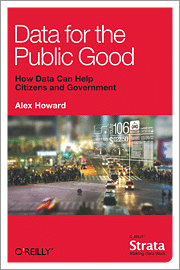Dear O’Reilly Media: Please produce more of these lovely bite-sized, thought-provoking short report/monographs!
 Data for the Public Good by Alex Howard is a concise and hard-hitting 22 pages long. I saw it as 100% long as I read it on met eReader between home and my morning coffee and porridge. 22 pages really works! It is just the right amount of superbly editing and curated data to engage with an absorb in a session in a fast-paced world. Reflect here on how we package and deliver information today.
Data for the Public Good by Alex Howard is a concise and hard-hitting 22 pages long. I saw it as 100% long as I read it on met eReader between home and my morning coffee and porridge. 22 pages really works! It is just the right amount of superbly editing and curated data to engage with an absorb in a session in a fast-paced world. Reflect here on how we package and deliver information today.
The iterative open data process is at the heart of revolution in any of the sectors touched: data drives demand -> public demand drives better data –> version control (and fluidity of release) adds dimension to this data.
The book itself is a succinct survey of examples and principles supporting more open sharing of data (both public and private) for the service of citizens and citizenry. Although much of of this book focuses on open government data, it is the public good served by both public and private data that is in discussion and doesn’t shrink from broaching the sensitive areas of privacy and economic value. Alex Howard admits readily that ‘accountability and transparency are important civil goods, but adopting open data requires grounded arguments for a CFO to support these.’ Data for the Public Good explores the political, financial, transportation and health systems rapidly identifying the key points of friction, challenge and benefit that can be derived by open-minded consideration of how both the availability of data and our perceptions of our data-informed lives are changing how we see and govern ourselves.
Three aspects highlight the innate value of open data to better government according to Howard:
- open data can rebuild fractured and bankrupted trust in the system and pay dividends over time;
- open data can create an accountable workforce through KPI driven dashboards to increase efficiency;
- availability of open data supports business building as the connection between reading human vital signs is transferred to an understanding of the vital signs of the city, and;
- open data driven predictability analysis identifies service cost savings, intervention points and leads to greater efficiencies.
In the healthcare sector, the author reaffirms the ethos that is the ‘quantified self movement (I write this with a FitBit strapped to my belt ; -) and reminds that in healthcare, although its is easily demonstrated that awareness directly impacts on more effective diagnosis and treatment, ‘you don’t just go and download data and slather [it] on yourself and get healed. Data is useful when it’s integrated with other stuff that does useful jobs for doctors, patients and consumers.’ Behaviour and our approach to making good data a part of good practise holds the keys to improving healthcare in the longer term.
Finally, and I think crucially to both the argument and the movement, Howard cites Todd Parks’ contention that value is derived not just by releasing more data, but by making that data truly accessible and usable – two key points that I have a sense get overlooked in the popular discussions surrounding Open Access to data today. Note: Open + Access (does not equal) Open Access : These terms together are very different from the separate words dealt in isolation.
This is a short book about the ethos behind the open data tagline. It’s an empowering, short read with a multitude of examples and particularly well enunciated message: our behaviour is rapidly evolving in response to the increasingly data-driven lives we lead – there’s great individual opportunities and even greater collective rewards. Did I mention it’s a free download from O’Reilly Media at: http://shop.oreilly.com/product/0636920025580.do
